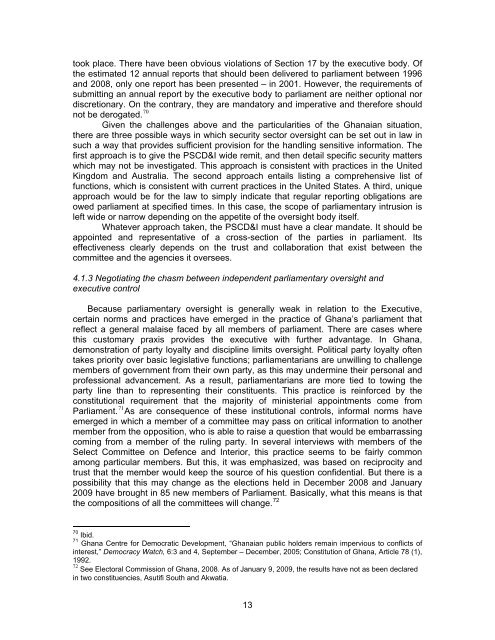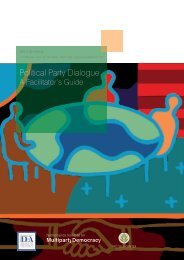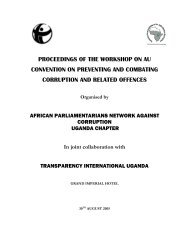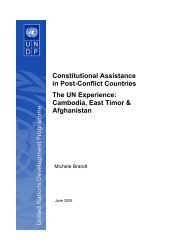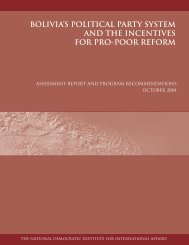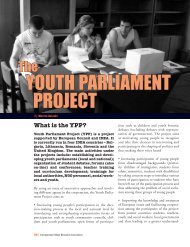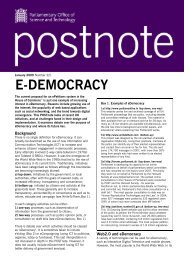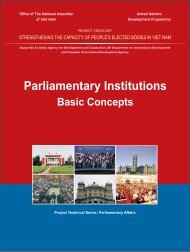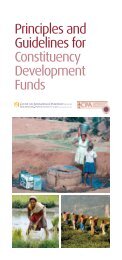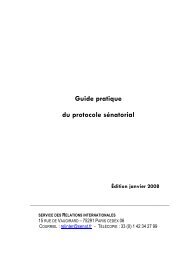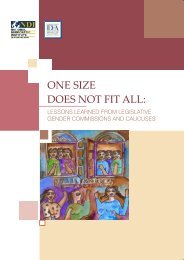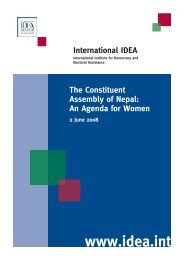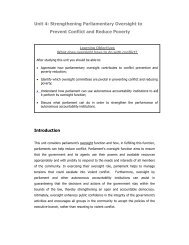Parliamentary Oversight of the Security Sector: Lessons from Ghana
Parliamentary Oversight of the Security Sector: Lessons from Ghana
Parliamentary Oversight of the Security Sector: Lessons from Ghana
You also want an ePaper? Increase the reach of your titles
YUMPU automatically turns print PDFs into web optimized ePapers that Google loves.
took place. There have been obvious violations <strong>of</strong> Section 17 by <strong>the</strong> executive body. Of<strong>the</strong> estimated 12 annual reports that should been delivered to parliament between 1996and 2008, only one report has been presented – in 2001. However, <strong>the</strong> requirements <strong>of</strong>submitting an annual report by <strong>the</strong> executive body to parliament are nei<strong>the</strong>r optional nordiscretionary. On <strong>the</strong> contrary, <strong>the</strong>y are mandatory and imperative and <strong>the</strong>refore shouldnot be derogated. 70Given <strong>the</strong> challenges above and <strong>the</strong> particularities <strong>of</strong> <strong>the</strong> <strong>Ghana</strong>ian situation,<strong>the</strong>re are three possible ways in which security sector oversight can be set out in law insuch a way that provides sufficient provision for <strong>the</strong> handling sensitive information. Thefirst approach is to give <strong>the</strong> PSCD&I wide remit, and <strong>the</strong>n detail specific security matterswhich may not be investigated. This approach is consistent with practices in <strong>the</strong> UnitedKingdom and Australia. The second approach entails listing a comprehensive list <strong>of</strong>functions, which is consistent with current practices in <strong>the</strong> United States. A third, uniqueapproach would be for <strong>the</strong> law to simply indicate that regular reporting obligations areowed parliament at specified times. In this case, <strong>the</strong> scope <strong>of</strong> parliamentary intrusion isleft wide or narrow depending on <strong>the</strong> appetite <strong>of</strong> <strong>the</strong> oversight body itself.Whatever approach taken, <strong>the</strong> PSCD&I must have a clear mandate. It should beappointed and representative <strong>of</strong> a cross-section <strong>of</strong> <strong>the</strong> parties in parliament. Itseffectiveness clearly depends on <strong>the</strong> trust and collaboration that exist between <strong>the</strong>committee and <strong>the</strong> agencies it oversees.4.1.3 Negotiating <strong>the</strong> chasm between independent parliamentary oversight andexecutive controlBecause parliamentary oversight is generally weak in relation to <strong>the</strong> Executive,certain norms and practices have emerged in <strong>the</strong> practice <strong>of</strong> <strong>Ghana</strong>’s parliament thatreflect a general malaise faced by all members <strong>of</strong> parliament. There are cases wherethis customary praxis provides <strong>the</strong> executive with fur<strong>the</strong>r advantage. In <strong>Ghana</strong>,demonstration <strong>of</strong> party loyalty and discipline limits oversight. Political party loyalty <strong>of</strong>tentakes priority over basic legislative functions; parliamentarians are unwilling to challengemembers <strong>of</strong> government <strong>from</strong> <strong>the</strong>ir own party, as this may undermine <strong>the</strong>ir personal andpr<strong>of</strong>essional advancement. As a result, parliamentarians are more tied to towing <strong>the</strong>party line than to representing <strong>the</strong>ir constituents. This practice is reinforced by <strong>the</strong>constitutional requirement that <strong>the</strong> majority <strong>of</strong> ministerial appointments come <strong>from</strong>Parliament. 71 As are consequence <strong>of</strong> <strong>the</strong>se institutional controls, informal norms haveemerged in which a member <strong>of</strong> a committee may pass on critical information to ano<strong>the</strong>rmember <strong>from</strong> <strong>the</strong> opposition, who is able to raise a question that would be embarrassingcoming <strong>from</strong> a member <strong>of</strong> <strong>the</strong> ruling party. In several interviews with members <strong>of</strong> <strong>the</strong>Select Committee on Defence and Interior, this practice seems to be fairly commonamong particular members. But this, it was emphasized, was based on reciprocity andtrust that <strong>the</strong> member would keep <strong>the</strong> source <strong>of</strong> his question confidential. But <strong>the</strong>re is apossibility that this may change as <strong>the</strong> elections held in December 2008 and January2009 have brought in 85 new members <strong>of</strong> Parliament. Basically, what this means is that<strong>the</strong> compositions <strong>of</strong> all <strong>the</strong> committees will change. 7270 Ibid.71 <strong>Ghana</strong> Centre for Democratic Development, “<strong>Ghana</strong>ian public holders remain impervious to conflicts <strong>of</strong>interest,” Democracy Watch, 6:3 and 4, September – December, 2005; Constitution <strong>of</strong> <strong>Ghana</strong>, Article 78 (1),1992.72 See Electoral Commission <strong>of</strong> <strong>Ghana</strong>, 2008. As <strong>of</strong> January 9, 2009, <strong>the</strong> results have not as been declaredin two constituencies, Asutifi South and Akwatia.13


